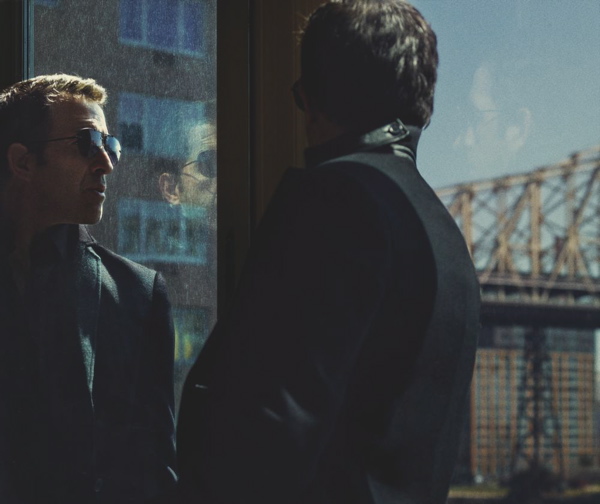Kenneth Cole
YOU TAKE A VERY TRADITIONAL GARMENT OR SHOE AND CHANGE SOMETHING SMALL ABOUT IT, AND THAT MAKES IT YOURS. Kenneth Cole
By now, the origin story is the stuff of populist mythmaking. Born in Brooklyn to the owner of a shoe manufacturing company, Kenneth Cole learned the family business before venturing out on his own in 1982 with the creation of Kenneth Cole Productions, Inc., a burgeoning footwear brand that he launched out of a trailer parked near the Hilton in Midtown, the permits for which he secured by masquerading as a film crew making a fake movie called The Birth of a Shoe Company. Over the ensuing three decades, Cole has emerged as a savvy rethinker of fashion, the fashion business, and the nature of the urban American wardrobe, with a preternatural instinct for sophisticated practicality and streamlined comfort while eschewing trends and sartorial theatrics. Today, with two clothing lines and four shoe lines, as well as accessories and fragrances, Cole has parlayed his can-do hustle into an international lifestyle brand, which he recently took private, embarking on a mission to both take the company back to its roots and propel it into the future. Of course, Cole’s notoriously provocative ad campaigns and newfound interest in the power of social media are also integral parts of the Kenneth Cole halo, as are his social and humanitarian endeavors, which led to the establishment of the Kenneth Cole Foundation, a philanthropic arm of his business designed to promote and support agents of change. In addition, Cole serves as chair of amfAR, is a board member of both HELP USA and the Sundance Institute, and last year opened the Kenneth Cole Haiti Health Center at St. Mary’s Hospital in Cité Soleil.This year, Cole is celebrating 30 years of Kenneth Cole Productions, an anniversary punctuated by his much-lauded return to the runway in February after a seven-year hiatus. In the fall, he will publish his third book, A Kenneth Cole Production (Rizzoli), and embark on a multi-city speaking tour of college campuses across the country.
Cole’s friend, Jon Bon Jovi—who this year rings in an anniversary of his own, celebrating 30 years of performing with a scrappy little rock band called Bon Jovi—recently connected with the 59-year-old designer at his office in New York.
KENNETH COLE: Is this the famous New Jersey rock star?
JON BON JOVI: I’m just a humble interviewer from Interview magazine.
COLE: [laughs] You know, every time I think I’ve seen the extent of your talents, I find there’s another.
BON JOVI: I hear journalists make big bucks, so I’m throwing my hat in the ring. I’m going to start real easy, because this is the 30th anniversary of you being a designer. Kenneth Cole Productions has been through a lot of changes over three decades. As a wiser man, what lessons would you tell the younger Kenneth Cole if you could go back in time?
COLE: What’s so great about my business is that every day is different than the day prior. Today, the industry bears little resemblance to the one I joined 30 years ago, which is what’s so exciting about it. But the one thing that hasn’t changed is the notion that a successful business model is one that has the ability to respond positively to the unexpected shifts in the winds as they continue to present themselves.
BON JOVI: Do you think you would’ve been drawn to fashion knowing what the business is today?
COLE: I think I would have. Every day, we all make the critical decision of what we’re going to wear, because many of the people we encounter in a day don’t get to know anything more about us than how we present ourselves. That decision—totally on our own terms—is a powerful one. So the privilege to be chosen to be part of that is a gift. People have a whole lot more choices than they’ve had in the past, and I have only earned the right to be considered—every day I have to earn the right to be chosen.
BON JOVI: I look back on clothes that I worn at certain times of my life that were not timeless and classic … [laughs] As opposed to when I put on one of your sport jackets or sweaters or leather jackets or pairs of shoes. I know that I’m going to feel comfortable looking at a photograph of myself in them 10 or 20 years from now. When we became friendly about eight years ago, you were off the runway, and now you’ve come back to it. What motivated that move?
COLE: The industry changed in some very profound ways. I had left the runway because I had come to believe that it was questionably relevant and appropriate, because we were creating clothes that, to a large degree, never ended up making it to the stores. And the runway was being seen in markets where those clothes weren’t available. And it was seen at a time when the product was irrelevant, because the spring runway shows were usually in the fall. But I’ve come to realize that, with social media today, people consume fashion very differently than they ever have before—they post it, tweet it, “like” it, retweet it. Today, people define themselves by a collection of various elements in their lives that they connect to. They aggregate all that together on one Facebook page or one Pinterest page, and at the end of the day they become their own brands. Through all these social platforms, you get to connect with millions of people simultaneously. And the way people ultimately consume the product is not by buying it as you showed it on the runway, but instead they fall in love with the brand, the aspiration of the brand, and then they go to your website or into your stores, and they buy it the way they see it.
BON JOVI: But isn’t the “scene” of the fashion show and the runway and Fashion Week in New York as important as getting your line seen online?
COLE: During Fashion Week you have the global media all gathering, and their job is to disseminate what happens for the next 20 minutes to their universe. So the messengers are what’s different between Fashion Week and otherwise.
BON JOVI: So what is it that motivates you in 2013, as opposed to any other time in your career?
COLE: I took the company private recently, and I’m really thinking differently about the business today than I have for the past 20 years, because I have the luxury now of making a commitment that has the ability to pay off over time, rather than quarter by quarter. I’m making an investment to elevate the quality of the design, the construction, and the distribution—all of that is in the works as we speak. It takes a little bit of time for it to manifest itself, but that is a commitment that I’m making to the business in an effort to make it more relevant and more appropriate today.
BON JOVI: What is the story behind the name Kenneth Cole Productions, Inc.?
COLE: Well, 30 years ago, I had a little bit of money and a little bit of time to get into business. And at the time, I could either take a room at the Hilton hotel, which is what most of the companies did who were trying to sell to the same people I was, or I could take a big, fancy showroom within a two-block radius of the Hilton hotel, in Midtown Manhattan‚neither of which I could really afford. So on a whim, I called a friend in the trucking business and asked if I could borrow a 40-foot trailer. He said, “This is New York. You can’t park a bicycle for 15 minutes, let alone a truck for two days.” And I said, “But if I can, will you lend it to me?” He said yes. And then I called Mayor Koch’s offices and said, “Mr. Mayor, how does one get permission to park a 40-foot trailer?” And the answer was essentially, “This is New York. We give permits only to utility companies or production companies who are shooting a full-length motion picture.” So that afternoon, I went to the stationary store, changed the name of the company from Kenneth Cole, Inc. to Kenneth Cole Productions, Inc., filed for a permit the following morning to shoot a full-length motion picture called The Birth of a Shoe Company. Soon after that, we had stanchions, klieg lights, a cameraman—sometimes there was film in his camera, sometimes there wasn’t. We had everybody line up one at a time and we sold 40,000 pairs of shoes in three and a half days, and we haven’t looked back. Ironically, though, 30 years later, we finally did our first film, The Battle of AmfAR, which premiered at Sundance in January. It marries all my passions—community, philanthropy, and in this case, a cure for AIDS.
BON JOVI: There’s no shortage of Kenneth Cole’s philanthropy—AmfAR, Sundance, HELP USA, Haiti—and there always seems to be a social message tied to your clothing and your shoe line that keeps people thinking. The witticisms in your campaigns are so unique and thought-provoking. Did you ever have a desire to be a writer?
COLE: You know, I didn’t. But I’ve always contemplated interesting ways to manipulate that which we take for granted. I think that is part of a skill set that has helped me as a designer, because you take a very traditional garment or shoe and change something small about it, and that makes it yours. I think that has defined my brand. I do that just naturally: I’m walking down the street and looking at what people are wearing and I’m constantly saying to myself, “This is what they should be wearing. If I could just make it look more timely and relevant … ” And I do that with the English language—I’m distorting and abusing that language which we cherish and take for granted.
BON JOVI: “That guy looks bad in those shoes.”
COLE: [both laugh] I think the power of messaging is saying something in as few words as possible because I think we all essentially have ADD. It’s not a clinically diagnosed state anymore; it’s a socially imposed state. But it’s fun. In the past, it was very frustrating, because I only had two or three times a year that I could do it, during our advertising seasons. Now, with Twitter and Facebook, I can do it all the time.
BON JOVI: I remember I had a shirt of yours that I believe said, “In war, is it who’s left or who’s right?”
COLE: “In war, is it who’s right or who’s left?”
BON JOVI: That was fantastic. You could have just said something negative about what became the Iraq war, but you made people think about their position. What is it that inspired you to want to take so much time to give back?
COLE: I have come to learn—and I know you have as well—that if you can make what you do somehow bigger than what it is, certainly more relevant than what it is, or make it somehow able to affect people in a meaningful way, then it is so much more fulfilling.
BON JOVI: I often tell people who volunteer at the Soul Kitchen [a community restaurant and project of the Jon Bon Jovi Soul Foundation, where customers pay for meals by donation or volunteering] that the way they’ll feel when they leave is so unique and special—that they’ll feel a part of something that is bigger than all of us. Going forward, where do you see Kenneth Cole Productions?
COLE: My job isn’t to tell people what they should wear; my job is to find out what people want and to give it to them, but not quite how they expect it. And it’s not a monologue; it’s truly a dialogue. Not just in the delivery of the product, but in the delivery of the message. Social media has totally transformed the way we communicate with each other and the way we provide for needs as we see them. I’ve always believed that if somebody looks good, they invariably are going to feel good. And it’s self-fulfilling, because you’ll just relax, you’ll smile, you’ll think you own the world. But if you also do good, you’ll feel even better. So my goal is to make what we do meaningful in as many people’s lives as we can.
BON JOVI: Amen to that.
JON BON JOVI IS A GRAMMY AWARD-WINNING MUSICIAN AND CHAIRMAN OF THE JON BON JOVI SOUL FOUNDATION.







